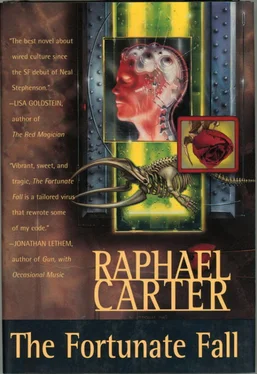“Oh, clever thing!” Keishi said. “Beautifully timed!”
“What good does that do it?” I asked. “Eventually that part of grayspace will be reactivated. If Swazi can’t find time to run it, someone else will.”
“Yes, but the eel will still have its momentum and the shark won’t,” Keishi said. “Besides, by then the shark may have lost interest.” Then she was silent for a long time. I was about to ask another question when she said thoughtfully: “Although, I don’t know, some sharks are damned persistent.” She slowed a little, as if she might go back to chase the shark away. But she shook the impulse off, and we swam on through Veles.
“This is nice,” I said. “The water—I mean, grayspace is clear here. No weeds, no debris.”
“Veles is reliable. They’ve held on to this section of grayspace for weeks without a serious slowdown. So the gazehounds and sharks keep things pretty clean. Yes, it’s nice. Nice if you’re armored.”
A school of spheres came toward us from above, enveloped us, and matched our pace. Then they turned silvery, reflecting us. It was like seeing your image in a thousand hand-mirrors.
“What are those?” I said.
“Doppelgangers. They won’t hurt you, they’ll just imitate you.”
“Like mirror-fish?”
“Not really. Mirror-fish just imitated for camouflage. Dopplers do it to learn better algorithms, to take back to their queen. They won’t get much from us, though—we’re optimized for a different universe.”
“I thought that kind of imitation was what shielding was meant to prevent. Algorithmic quarantine, and all that. You know, ‘Imagine the destruction of native culture that would ensue if you dropped a radio on some unsuspecting tribe of Bushmen—’”
“Oh, that’s an excuse. Bushmen, my ass. They only said that to piss off the Africans. If you dropped a radio on a traditional village, they’d bloody well use it to grind flour—they’d see it in a way appropriate to their world. No abo’s going to duplicate a human; we’re sloppy and inefficient, by their standards. The Weavers made all that up to keep people out of grayspace, because they were afraid grayspace would be impossible to control. But it didn’t work out that way. As you can see, right up ahead.”
The dopplers had gone; I saw nothing. “Where?”
“Dead ahead. Do you see her?”
“Who?”
“Look carefully—there.” She made an arrow in my visual field to point it out to me: a barely visible disturbance in the neurodes, moving slowly, like the shadow of a hawk against the ground.
“What is it?” I said.
“Weaver.”
“Why are we staying here? Why aren’t we running?”
“Stay calm, News One. It’s just a tendril. She can’t see us at this distance.”
“Why risk it?” I said. “Let’s just go.”
“Sit tight a minute,” she said, creeping toward it. “I want to see the rest of her.”
“Keishi!”
“Hold on.” And we were moving again, twice as fast as before. Beneath us was a vein of shadow that gradually widened and silvered, a creek becoming a river. Then suddenly it was a delta, and an ocean, and we were rocketing up away from it, until we could see all its twining tendrils and its spinning core. It looked like something you might see on the slide of a microscope; and then again it looked like a galaxy, something impossibly vast. I felt a rush of vertigo—a fear that I had lost myself, that I would never return to my body. I had to carefully concentrate out of the Net, and focus on the slow inflation of my lungs, to prove to myself I was still real.
“Let’s see which one she is,” Keishi said, and blew out a stream of bubbles.
“Are you insane?”
“Relax. The stimuli are so low-level she’ll hardly even notice them. And she couldn’t trace them to me if she did. I just want to see which one she goes for.”
The bubbles circled the shifting and spiraling Weaver. At length one of her tendrils flicked idly, like a hand absently grasping a teacup, and a bubble disappeared.
“Aha,” Keishi said respectfully. “This one sweeps for a brain virus called Parafango. Minor, but not as minor as I thought. —But then, this wouldn’t be the original. This virus killed three or four Weavers, before they finally made the nastiest strains extinct.”
“Who wrote it?”
“No one, it’s indigenous. It’s a timid little herbivore that learned to protect itself in grayspace by hiding in a human brain. Perfectly harmless, as long as you’re here. But if it gets downloaded into your flesh brain—well, they wiped out the one that trashes the arcuate fasciculus, thank God. So much for your Bushman’s radio; do you really think the Weavers could fight abos like that and still worry that we’d invade them?”
Her derision made me nervous, but the Weaver was still grazing unperturbed.
“Have you ever seen one before?” she asked.
“A Weaver? No,” I said. And then: “Not that I remember.”
“I’m glad you got the chance, then. Isn’t she beautiful?”
“Beautiful?” I said scornfully. “Necessary, maybe. I don’t want another Army any more than anyone else. But Weavers, beautiful? They scare the hell out of me.”
“Beautiful and terrible,” she said. “Like a snake, or a tiger.”
“Squids and spiders come to mind.”
“Oh, don’t be so literal. Doesn’t she remind you of—damn!” she cried out suddenly. And we were speeding through the Net again, in full flight.
“What happened?”
“She almost saw us,” Keishi said, slowing down. “It’s okay, she’s not pursuing. She was just curious.”
“That’s what you get for taking risks like that.”
She ignored the warning. “This,” she said, “is Darkness-at-Noon.”
I first saw Voskresenye as a tiny knot of neurodes, about the size of mine but more irregularly shaped, like an apple with some bites out of it. Grouper fish of some kind, not dopplers, were schooling around him. As Keishi circled him at a distance, I saw that the lump of neurodes was thickly cabled to a vast dark bulk that loomed above us, dwarfing even Keishi. It was like a storm-cloud that takes up the whole sky. The eye shrank from it. How the hell did a man that old get wired like that?
“How interesting.” The voice came from the little knob of cells I had first seen. “A delegation. Does one address Leviathan, or the seed in his stomach?”
Before I could answer, Keishi said “I was going to ask if you were the blimp, or the ugly dwarf in its gondola.”
“Keishi!” I cried out, shocked. But Voskresenye was not offended:
“I expected someone unenhanced, so I extruded something her own size for her to talk to. I hardly expected that she would come riding an elephant.”
Keishi swam a little closer toward him, and spoke a stream of static.
What was that? I subvocalized.
“Sapir.”
I know it’s Sapir, I said irritably. There are only two computer languages that have native human speakers, and KRIOL sounds different. I know Sapir when I hear it; I just never got past the segmentive case. What did you say?
“If you put in your new language chip—”
The audience doesn’t want to deal with Sapir any more than I do, I said. Will you just tell me?
“It was a superimposition of several comments involving his sexual preferences, his mother, and his bandwidth.”
Keishi, for God’s sake, I said. But by that time, she and Voskresenye had already exchanged more words in Sapir than I could hope to count. What’s he saying to you?
“Umm, let’s just say that only a few years ago it would have been anatomically impossible.”
Читать дальше












